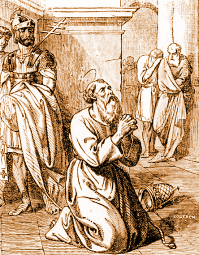Lives of the Saints
Our Models and Protectors
Spiritual Bouquet:
June 20

Saint Silverius
Pope and Martyr
(† 538)
Silverius was son of Pope Hormisdas, who had been married before he entered the ministry. Upon the death of Saint Agapetas, and after a vacancy of forty-seven days, Silverius, then subdeacon, was elected Pope and consecrated on the 8th of June, 536, despite maneuvers on the part of heretics opposed to the Council of Chalcedon.
The heretical empress Theodora, resolved to win Silverius over to her interests, wrote to him, ordering that he should either acknowledge as lawful bishop the Eutychian heretic Anthimus, who had been deposed as patriarch of Constantinople, or come in person to Constantinople and reexamine his cause. Without the least hesitation or delay, Silverius returned her a short answer, by which he gave her to understand that he neither could nor would obey her unjust demands, which would be to countermand his predecessor's decision and betray the cause of the Catholic faith.
The empress, finding that she could expect nothing from him, resolved to have him deposed. Vigilius, archdeacon of the Roman Church, a man of diplomacy, was then at Constantinople. To this ambitious ecclesiastic the empress exposed her wishes, and promised to make him pope and to bestow on him seven hundred pieces of gold, if he would engage himself to condemn the Council of Chalcedon and receive into Communion the three deposed Eutychian patriarchs. Vigilius assented to these conditions, and the empress sent him to Rome, charged with a letter to the Roman general Belisarius, commanding him to drive out Silverius and contrive the election of Vigilius to the pontificate.
Vigilius urged the general to execute this project. In order to implement it, the Pope was accused of corresponding with the enemy, and a forged letter was produced, supposedly written by him to the king of the Goths, inviting him to the city and promising to open the gates to him. These dealings succeeded; Vigilius was made Pope, and Silverius was banished to Patara in Lycia.
The bishop of Patara received the illustrious exile with all possible marks of honor and respect, and thinking himself bound to undertake his defense, journeyed to Constantinople and spoke boldly to the emperor Justinian. He terrified him with threats of divine judgments for the expulsion of a bishop of so great a see, telling him, There are many kings in the world, but there is only one Pope over the Church of the whole world. Justinian appeared startled at the atrocity of the proceedings and gave orders that Silverius be sent back to Rome. The enemies of the Pope contrived to prevent this, however, and he was intercepted on his road toward Rome and transported to the deserted island of Palmeria, where he died of hunger a year later, on the 20th of June, 538 and was buried.
It was perhaps in response to the martyred pope's prayers that after his death the usurper of the pontifical throne, Vigilius, though he had wished to step down, was forced to remain in function and then transformed, like Saul of Tarsus, into another man. He exercised the pastoral duties with as much courage, piety, zeal and faith, as he formerly had used violence, avarice and cruelty during his predecessor's lifetime. The traitor Belisarius was accused of conspiracy against the emperor, stripped of all he had, and his eyes put out; he was obliged to beg for alms in Constantinople. But he too repented and built a church with an inscription over the door which was a public reparation for his fault.
Les Petits Bollandistes: Vies des Saints, by Msgr. Paul Guérin (Bloud et Barral: Paris, 1882), Vol. 7; Little Pictorial Lives of the Saints, a compilation based on Butler's Lives of the Saints, and other sources by John Gilmary Shea (Benziger Brothers: New York, 1894).